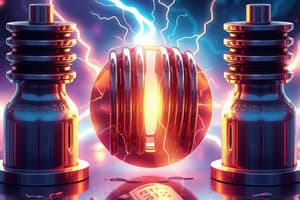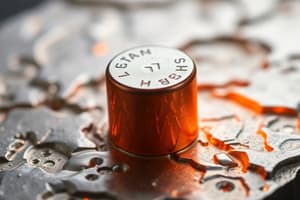Podcast
Questions and Answers
why are metals good conductors of electricity
why are metals good conductors of electricity
-the delocalised sea of electrons (valence electrons) are mobile, so can move freely throughout the metallic lattice -these mobile electrons can carry a charge throughout the structure, and the mobile sea of e- move toward the positive terminal of power supply while the positive metal ions remain stationary in their fixed positions
why are metals good conductors of heat
why are metals good conductors of heat
-e- within sea of e- are mobile and so can carry heat energy (as kinetic energy) throughout metal lattice -the vibration of metallic ions also contributes to the flow of heat through the metal lattice
why are metals malleable and ductile
why are metals malleable and ductile
bonding btwn metal ions and sea of e- is non-directional -individual metal cations can move in relation to each other without breaking the bonds between them and the sea of electrons -allowing metal to change shape
why are metals solid at room temperature
why are metals solid at room temperature
why are ionic solids poor conductors of electricity in the solid phase
why are ionic solids poor conductors of electricity in the solid phase
why are ionic compounds good conductors of electricity when molten/(aq)
why are ionic compounds good conductors of electricity when molten/(aq)
why are ionic compounds hard and brittle
why are ionic compounds hard and brittle
why do ionic compounds have high melting and boiling points
why do ionic compounds have high melting and boiling points
why are covalent molecular substances non-conductors of electricity in either solid, liquid or aqueous phase
why are covalent molecular substances non-conductors of electricity in either solid, liquid or aqueous phase
why are covalent molecular substances soft and weak
why are covalent molecular substances soft and weak
why are covalent network substances non-conductors of heat or electricity
why are covalent network substances non-conductors of heat or electricity
Flashcards are hidden until you start studying
Study Notes
Conductivity of Metals
- Metals possess free-moving delocalized electrons, allowing efficient conduction of electricity.
- High concentration of these electrons results in strong electrical conductivity in metals.
- Metals conduct heat well due to free electrons transferring energy rapidly through the lattice structure.
Properties of Metals
- Malleability allows metals to be hammered or pressed into shapes without breaking; ductility permits stretching into wires.
- Metallic bonding provides flexibility, allowing layers of atoms to slide over each other without breaking bonds.
- Most metals are solid at room temperature due to strong metallic bonds that require high energy to overcome.
Behavior of Ionic Solids
- Ionic solids are poor conductors of electricity in the solid phase because charged ions are fixed in a lattice and cannot move freely.
- When molten or dissolved in water, ionic compounds conduct electricity well as ions can move freely in a liquid state.
Strength and Hardness of Ionic Compounds
- Ionic compounds are hard and brittle due to strong electrostatic forces between tightly packed oppositely charged ions, which break upon stress.
- High melting and boiling points arise from these strong ionic bonds, requiring significant energy to break apart the lattice structure.
Characteristics of Covalent Molecular Substances
- Covalent molecular substances are non-conductors of electricity across all phases because they lack charged particles that can move freely.
- Typically soft and weak, these substances have low intermolecular forces (e.g., van der Waals forces), leading to easy deformation.
Properties of Covalent Network Substances
- Covalent network substances are structured with a large number of covalent bonds, making them poor conductors of heat and electricity.
- The rigid structure results in high melting and boiling points, but the absence of free-moving electrons or ions leads to non-conductivity.
Studying That Suits You
Use AI to generate personalized quizzes and flashcards to suit your learning preferences.



